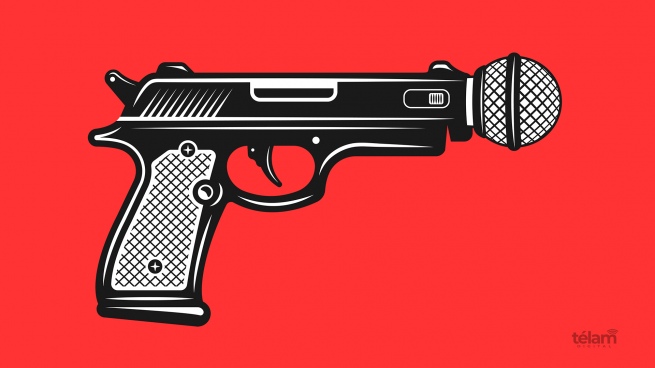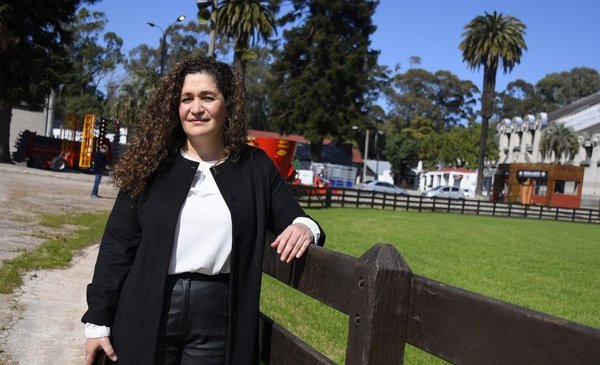Officials, legislators, Amnesty International, the Anne Frank Argentina Center for Latin America and experts on hate speech agreed that the attack on Cristina Fernández is not attributable to an isolated incident but to public demonstrations that “incite violence”, and they agreed in demanding responsibility from “political and media leaders” that led to the “demonization” of the figure of the vice president.
The head of the National Public Defender’s Office, Miriam Lewin, affirmed that the attempted assassination of Vice President Cristina Fernández reveals that hate speech in the political and media spheres “can have an effect in the real world.”and called for “responsibility” from the media.
“It is a fact that reveals how, when hate speech circulates through the media and in the mouths of some members of the parliamentary representation, this can have an effect in the real world,” he explained in reference to the attack with a gun. fire that the vice president experienced last night at the door of her home at the intersection of Uruguay and Juncal, in the Buenos Aires neighborhood of Recoleta, when she greeted militants.

As an example of hate speech, he mentioned the reproduction in the media of “statements by legislative representatives where they assured that the vice president deserves the death penalty. Reproducing this, without showing the context, is hate speech,” he concluded.
The head of the National Institute against Discrimination, Xenophobia and Racism (Inadi), Victoria Donda, affirmed -for her part- that the seriousness of the attack on the Vice President should not be read as “an isolated incident”but as “part of a context of growing hatred”, in which the assassination attempt was a “foreseeable” event.
“Hate speech not only expresses an opinion, but also seeks to generate an effect on those who listen to it, seeks to generate an action. The attempted assassination that we saw last night is one of the most predictable events of political violence that there was,” Donda told Tel.
The head of Inadi added that “there is an ideological violence in the media that spoke of the destruction of Cristina as a symbol of a sector of politics”, and for this reason she considered that it was not “an isolated event”, but that it was “part of a context of growing hatred”.
“The hatred of the Vice President” became “the banner” of certain party and institutional sectors, reflected Donda.
The official, accompanied by the agency’s delegates throughout the country, called for a meeting of the authorities participating in the Federal Council for Anti-Discrimination Public Policies to discuss legislation against hate speech that can be sent to the National Congress. in the short term. The appointment will be next Thursday, September 8, and will include the participation of the National Public Defender’s Office, the Institute against discrimination of the City of Buenos Aires and officials whose tasks are related to the matter.
Given the assassination attempt on the Vice President, “it is urgent to expand the democratic debate and with a federal character of a parliamentary initiative that seeks to put an end to anti-democratic expressions and actions,” Inadi said in a statement.

For her part, the researcher and member of the board of directors of Radio y Televisión Argentina SE, Cynthia Ottaviano criticized “hate speech and fake news” generated by “powerhouses that misinform by appealing to emotions” and said that their objective is to “destabilize democracies”.
Ottaviano, who was the founder and head of the Public Defender’s Office between 2012 and 2016, was “dismayed” by the attack against Vice President Cristina Fernández de Kirchner, and in dialogue with Radio Nacional Esquel considered the event as “an attack on the democracy”.
“I think you have to be very clear about what is happening in Argentina, For many years we have been making hate speech visible, we have been making denialism visible… what we have seen not only in Argentina, but in Ecuador, in Bolivia, a racist, classist and sexist coup d’état,” said the specialist.
He assured that “concentrated communication, platform capitalism promote hate speech, promote polarization to generate social chaos and instability in democracies.”
Hate speech as incitement to violence
For the director of Anne Frank Center of ArgentinaHéctor Shalom, the risk involved in supposing that the attempted assassination of Vice President Cristina Fernández de Kirchner was not “an individual event, of a madman on the loose” and pointed to the responsibility of political and media leaders who “construct the discourse of hate and incite violence.
“About what happened, I am interested in analyzing hate speech as an incitement to an act of violence because, finally, we saw that someone put into action what others built,” Shalom told Télam.
“That the author of the assassination has a Nazi symbol tattooed on his arm is a non-essential factthere is a risk of assuming that what happened is an individual event, of an individual subject, and it would be a misreading,” warned the director of the Anne Frank Argentina museum.
“That the perpetrator of the assassination has a Nazi symbol tattooed on his arm is non-essential data, there is a risk of assuming that what happened is an individual event, of an individual subject, and it would be a reading error”Hector Shalom

Shalom’s analysis of the assassination attempt against the Vice President coincided with Lewin’s when mentioning that “certain political and media leaders are the ones who made hate speech a demonization of the figure of the Vice President, and they are the ones who have a portion of responsibility in this act.
“At a time when discursive violence is a builder of political capital, the most violent (speech) has media impact and is more attractive to media marketing,” he said.
Regarding the work that remains to be done in Argentine society, Shalom appealed to the criminal figure of incitement to hatred and to the act of violence “as a tool to put a stop to this”, because “if society does not defend itself, it is weakened”.
“We must make an alliance with the audiences to recover the value of thought and say no to denigration or stigmatization,” he concluded.

The sociologist Ezequiel Ipar, who leads the Laboratory of Studies on Democracy and Authoritarianism (LEDA) of Unsam/Conicethighlighted the importance of understanding that “words do things” and that the attempted assassination of the vice president is “the complete passage” of what this type of public discourse generates.
It is necessary to break with “that idea, sometimes justifying hate speech, that it is only about dramatizations, that they are not real, that they are only like fictions or a way of expressing intimacy,” Ipar assured in dialogue with Télam.
Public speeches, “when they are hate speeches, generate the conditions for the possibility of political violence” and what happened last night “was the complete passage of what hate speeches do,” he said.
“It is urgent to disarm some of the components of what ended in this assassination attempt that may have been tragic for our country”pointed out the specialist, and detailed that these “components” have to do with “the justification and aestheticization of violence in social networks or in certain media.”
In this sense, Ipar also blamed “some” media outlets or communicators “that put on a show of violence or lead curious characters, but that the discourse they normalize is that of the justification of violence, the aestheticization of those performances streets where they encourage all this political violence.
“People who have public responsibility must deliberate if they join this circuit of justification for violence, we must begin to dismantle this type of discourse because we are already in the abyss, we have crossed the line and we are suspended in the air. We must stop this political violence,” he concluded.

The executive director of Amnesty International ArgentinaMariela Belski, also expressed her “strongest repudiation” of the attack suffered by the Vice President of the Nation, and warned about “the exponential and harmful presence of hate messages in public discourse.”
“These messages generate a worrying and tangible level of violence. There is a responsibility of certain groups in society that use media and platforms exercising discrimination, collaborating with a potential silencing effect, and with consequences that can impact audiences,” he said in statements. to Telam.
Belski claimed “that yesterday’s reprehensible attack helps us to understand that we cannot continue like this.”
Violence and hate speech are expressions of the political crisis
The violence and hate speech that were consolidated in different scenarios are expressions of the political crisis that Argentina is experiencing, according to Conicet researcher and professor at the National University of Quilmes (UNQui), Natalia Aruguete.
Aruguete maintained, in statements to Télam, that “the political crisis that Argentina is experiencing, which has been revealed at an unprecedented level in recent times, finds one of its expressions in the high levels of political violence to which we have reached. This violence has activated and consolidated hate speech of different kinds in different scenarios. Among them, the media-digital one appears as a very powerful one”.
“The profile that we know so far of the man who attacked Vice President Cristina Fernández has traits associated with neo-Nazi activism, a phenomenon that may not be observed in such a widespread and institutionalized manner at the national level, but which maintains consolidated interconnections at the international level. “, he pointed.
The researcher pointed out that “in this context, the digital scenario -and social networks, in particular- constitute a significant contribution; they not only allow an extension of these groups beyond local borders, but also facilitate the exchange of information and the elaboration of discursive strategies that authorize this type of episodes”.
“It is here where the extension of political and digital violence -and hate speech as an expression of that violence- are an essential platform where biased, xenophobic and persistent racist narratives are deployed and oiled; condition of possibility for events to occur shocking like the one lived last night”, completed Aruguete.















